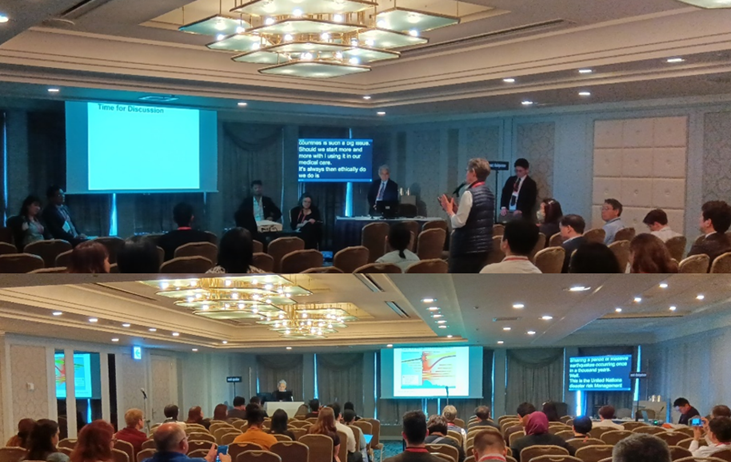WADEM 2025 Panel Discussion: Multidisciplinary Collaboration for Health Security
The 23rd Congress of the World Association for Disaster and Emergency Medicine (WADEM Tokyo 2025) as held at the Keio Plaza Hotel in Tokyo (May 2-6, 2025). More than ten members, including students, participated from Kyoto University School of Public Health and Kyoto University Hospital, and conveyed important experiences, insights, and findings to the global community.
The Center for Health Security (CHS) at Kyoto University led a session titled “How to Develop Multidisciplinary Solution-Oriented Research and Education in Disaster Medicine and Public Health” on May 4th. This was a truly invaluable opportunity, as global leaders from diverse fields across four continents came together to explore transdisciplinary approaches.
The panelists were:
– Prof. Virginia Murray, Head of Global Disaster Risk Reduction, UK Health Security Agency: “Sendai Framework for Disaster Risk Reduction: WHO Health Risk Reduction Framework and UNDDR/ISC Hazard Reduction Framework”
– Prof. Gilbert Burnham, Johns Hopkins Center for Humanitarian Health / Bloomberg School of Public Health, Johns Hopkins University: “Challenge: How to Develop Multidisciplinary Solution-Oriented Research and Education in Disaster Medicine and Public Health: An Educational Perspective”
– Dr. Derrick Tin, WADEM-Board Member / University of Melbourne / Disaster Medicine, Beth Israel Deaconess Medical Center, Harvard Medical School: “Enhancing Social Health Security Through Transdisciplinary Collaboration”
– Prof. Norio Maki, Disaster Prevention Research Institute, Kyoto University: “Trials of Kyoto University Medical Hospital and Disaster Prevention Research Institute”
– Prof. Kaori Muto, Medical Ethics & Public Policy, Institute of Medical Science, the University of Tokyo: “Advancing Ethical and Sociological Readiness for Interdisciplinary Research in the Wake of Large-Scale Earthquakes”
– Prof. Yuichi Imanaka, Centre for Health Security, Graduate School of Medicine, Kyoto University: “Multidisciplinary Solution-oriented Research and Education for Health Security”, Organizer and Chair of this session
Following the panelists’ presentations, participants posed a wide range of questions and comments. There was a lively discussion on how to design activities that effectively engage various stakeholders in promoting evidence-based practice and policy for health security, and how to break down the vertical structures—the so-called “silos”—of related disciplines and organizations in disaster health management.
As a result of the discussion, the chair presented the joint proposal (outlined below), which was endorsed by all participants with applause.
— Establish government-academia-practitioner partnership for everyday preparedness and crisis response.
— Promote global, multidisciplinary collaboration platforms in research, education, practice, and policy.
— Strengthen capacity development both for disaster health management professionals and for the general public.
The session concluded amid great enthusiasm, and afterward, small groups of participants engaged in conversations throughout the venue.
